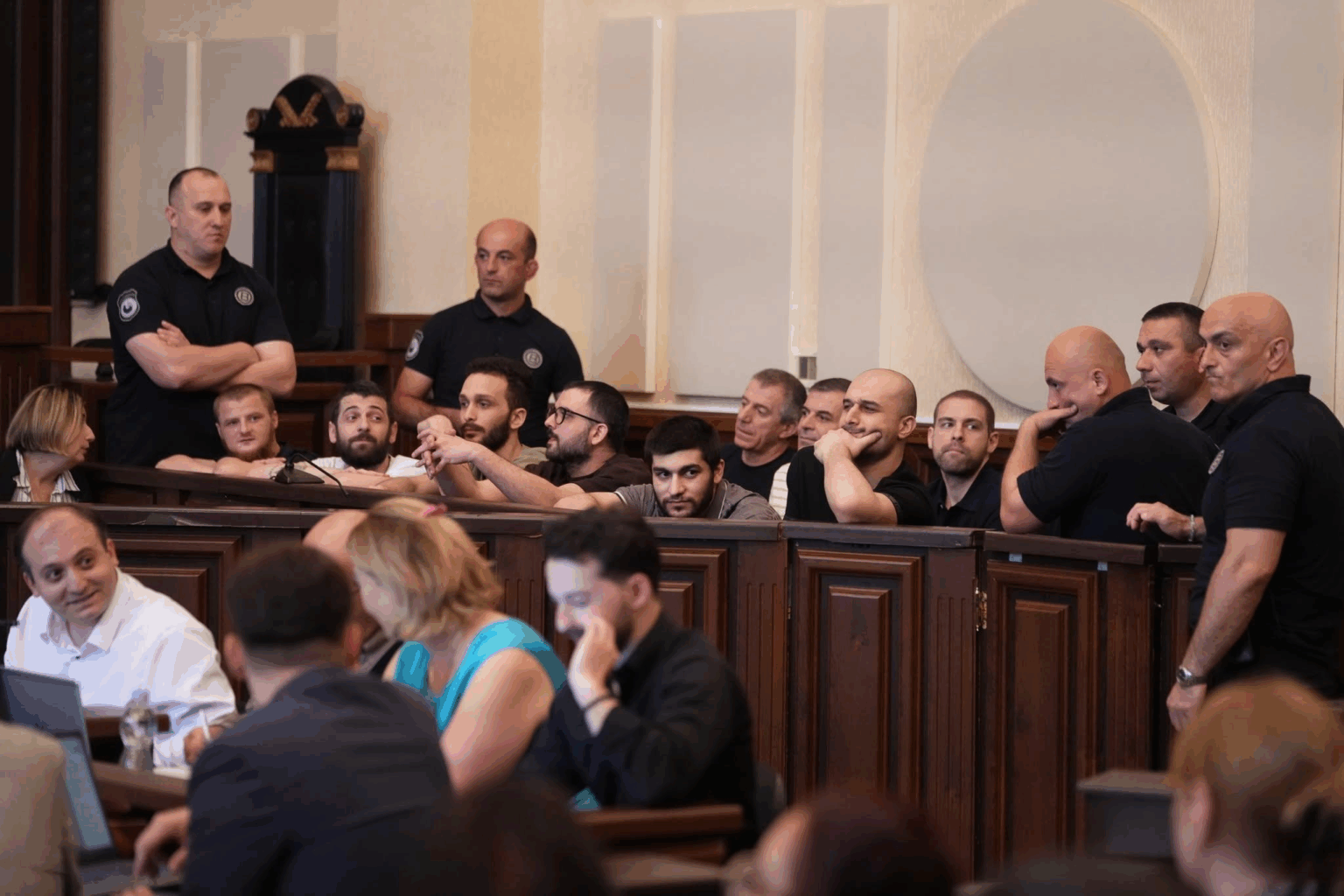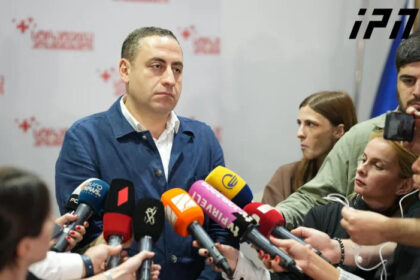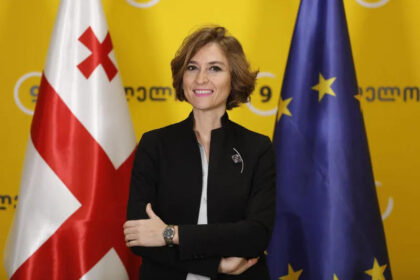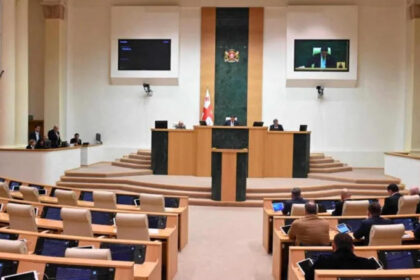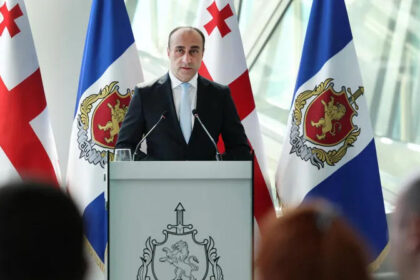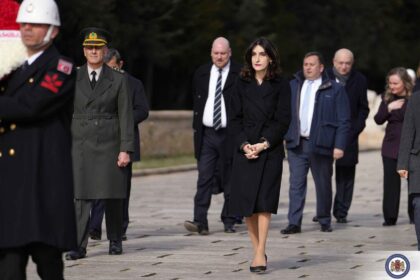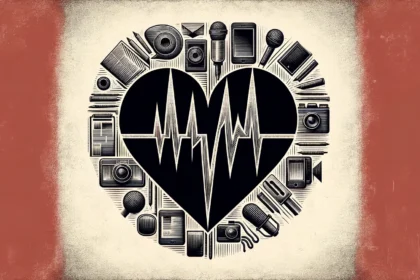Eleven protesters detained during the December rallies were sentenced to two years in prison each after Tbilisi City Court found them guilty of organizing and participating in a group activity that “disrupted public order.”
Judge Nino Galustashvili delivered the ruling on September 3 against the group that included Andro Chichinadze, Onise Tskhadadze, Guram Mirtskhulava, Luka Jabua, Jano Archaia, Ruslan Sivakov, Revaz Kiknadze, Giorgi Terashvili, Valeri Tetrashvili, Sergey Kukharchuk, and Irakli Kerashvili. The verdict followed a last-minute downgrade of the original, more serious charge of organized group violence, with the defendants pleading innocent, contesting both the allegations that the defendants were acting as a group, as well as individual claims about committing violent acts against police.
The verdict was delivered before a packed courtroom of more than a hundred people, while many more supporters waited outside. Georgia’s fifth president, Salome Zurabishvili, was present at the final hearing.
“My fate has been decided without me for months, without any reason. I hope I will understand the reason, but how can I understand what does not exist?” Revaz Kiknadze told the court in his closing remarks on August 29, according to the written records made by RFE/RL Georgian Service. Kiknadze, along with Sergey Kukharchuk and Guram Mirtskhulava, skipped the final hearing in protest.
The group, which, among others, featured prominent faces, such as actor Andro Chichinadze and comedian Onise Tskhadadze, as well as two Ukrainian nationals – Kukharchuk and Sivakov – has attracted widespread attention. It was also a group case with the largest number of defendants. The verdict followed months of intensive court proceedings, with the judge scheduling hearings several times a week, a pace lawyers attributed to efforts to issue a ruling within the maximum nine-month pre-trial detention period.
The defendants, with their ages ranging between 21 and 54, were initially charged under Article 225 of the Criminal Code, which carries a penalty of four to six years in prison. On September 3, the judge reduced the charges to “organization of group activity disrupting public order or active involvement in it” under Article 226, which allows for penalties ranging from fines and community service to house arrest or imprisonment of up to three years. Another group of eight protesters was sentenced to 2-2.5 years in jail the day before, following a similar reclassification.
Prosecutors alleged the defendants took part in group violence by assaulting riot police during the November–December protest dispersals. The defense rejected the accusations, citing inconsistencies in the claims of prosecutors and police witnesses. Lawyers argued that video evidence failed to show the defendants acting as a coordinated group, contained no timestamps, and, in some cases, appeared edited. They also said no messages or social media activity suggested coordination, and no evidence showed the defendants harmed police officers.
A key moment came during the July 29 hearing, when lead investigator Arsen Khunashvili admitted during a testimony that “the direct connection of the defendants to the organizers is not evident.” He added that while some video footage showed a few defendants together, there was no evidence of direct links to organizers.
Also during the July 29 hearing, detainees reported being offered pardons in exchange for apologies by Georgian Dream–elected President Mikheil Kavelashvili, the offer they collectively rejected.
Another inconsistency arose during testimony in June when Valeri Tetrashvili’s lawyer asked Gogita Kharatishvili, the police witness, to identify Tetrashvili in court. The witness pointed to a person, saying, “There he is, standing there, looking straight at me.” Tetrashvili, however, was not present during the hearing that day.
Revaz Kiknadze, one of the defendants, alleged that he was subjected to threats and intimidation upon his detention, recalling that he was taken away from the city center and threatened by police with being buried alive and sexually assaulted. Two of the defendants in the case – Onise Tskhadadze and Guram Mirtskhulava – lost their parents while in detention.
35 persons in total detained in the context of the pro-EU and anti-Georgian Dream protests since last November have faced jail sentences, including Saba Skhvitaridze, Zviad Tsetskhladze, Vepkhia Kasradze, Vasil Kadzelashvili, Giorgi Gorgadze, Irakli Miminoshvili, Insaf Aliev, Tornike Goshadze, Nikoloz Javakhishvili, Anton Chechin, Archil Museliantsi, Davit Khomeriki, Anatoli Gigauri, Temur Zasokhashvili, Davit Lomidze, Mzia Amaghlobeli, Anri Kakabadze, Anri Kvaratskhelia, Saba Jikia, Giorgi Mindadze, Mate Devidze, Denis Kulanin, Daniel Mumladze and Guram Khutashvili.
Two protesters – Tedo Abramovi and Giorgi Akhobadze – have been acquitted of serious drug charges linked to the protests and activism.
More to follow…
11 Protesters Jailed for Two Years Each on Charges of ‘Disrupting Public Order’ as Group
